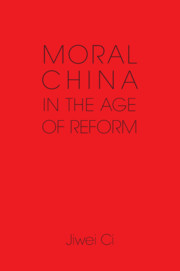Book contents
- Frontmatter
- Dedication
- Contents
- Acknowledgments
- Introduction
- 1 An Anatomy of the Moral Crisis
- 2 Political Order, Moral Disorder
- 3 Freedom as a Chinese Question
- 4 Freedom and Its Epistemological Conditions
- 5 Freedom and Identification
- 6 Neither Devotion Nor Introjection
- 7 The Insult of Poverty
- 8 Democracy as Unmistakable Reality and Uncertain Prospect
- 9 Freedom’s Unfinished Task
- 10 China’s Space of Moral Possibilities
- Index
- References
5 - Freedom and Identification
Published online by Cambridge University Press: 05 September 2014
- Frontmatter
- Dedication
- Contents
- Acknowledgments
- Introduction
- 1 An Anatomy of the Moral Crisis
- 2 Political Order, Moral Disorder
- 3 Freedom as a Chinese Question
- 4 Freedom and Its Epistemological Conditions
- 5 Freedom and Identification
- 6 Neither Devotion Nor Introjection
- 7 The Insult of Poverty
- 8 Democracy as Unmistakable Reality and Uncertain Prospect
- 9 Freedom’s Unfinished Task
- 10 China’s Space of Moral Possibilities
- Index
- References
Summary
1
In Chapter 3, I proposed an understanding of freedom in terms of the deeper notion of agency, and then in Chapter 4, I reinforced this proposal with a brief critical discussion of the conventional approach to the matter as represented by Thomas Metzger. Unlike in the conventional approach, I am inclined to start with the hypothesis that freedom is but a configuration of agency, to proceed with an argument for treating agency as the fundamental common denominator of all human values and their forms of expression, and then to see freedom (modern West) as one configuration of agency alongside of identification (China) as another possible and actually realized configuration. This is a line of thought I want to complete in this chapter.
There are two reasons for pursuing this line of thought and hoping that it succeeds. The first has to do with the reasonable yet by no means straightforwardly accomplishable ambition of wanting to understand different, sometimes very different, moral cultures (and other social constructions) in such a way that they can be compared and even, where appropriate, ranked. This ambition is easily derailed by two tendencies common in attempts to address the old and familiar question of how to characterize differences between, say, Chinese and Western moral cultures. One tendency is to conclude too quickly that the objects of comparison are somehow incommensurable, that is, incapable of being described and appraised in terms of a significant common denominator, a precondition for meaningful comparison. The other tendency is to settle for a common denominator that is actually drawn from one of the objects compared, and as a result the comparison is skewed from the outset. To save the comparative enterprise, we must find a common denominator that is free of both tendencies.
- Type
- Chapter
- Information
- Moral China in the Age of Reform , pp. 88 - 107Publisher: Cambridge University PressPrint publication year: 2014



